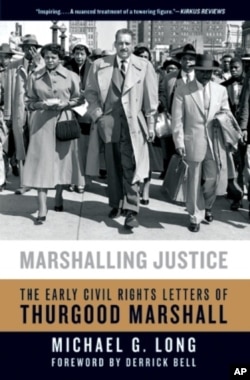Thurgood Marshall is perhaps best known as the first African-American justice on the Supreme Court, where he served from 1967 to 1991. But he had a long history of working for justice. As an attorney for the National Association for the Advancement of Colored People (NAACP), he waged legal battles against racial discrimination which helped reshape American society.
Now, a new collection of letters from that period offers a new portrait of Marshall as an important force in the civil rights movement.
Rosa Parks' refusal to give up her seat on a segregated bus in Montgomery, Alabama in 1955, and Martin Luther King Jr.'s leadership of the black boycott of the city’s public transportation system are widely acknowledged as pivotal events in the civil rights struggle. But almost 20 years before that, a young attorney with the NAACP laid the groundwork for the movement’s success.
"Martin Luther King Jr. emerges as the most important civil rights leader in the latter half of the 20th century exactly because of Thurgood Marshall’s work in the 20 years that led up to 1957," says Michael Long, author of "Marshalling Justice: The Early Civil Rights Letters of Thurgood Marshall." "It’s unfair to believe that King had just emerged from nowhere. He emerged out of a culture and society that had already begun to break down racial discrimination. In fact, Rosa Parks was a member of the NAACP."
The letters Marshall wrote between 1936 and 1957 reveal the depth and breadth of his civil rights work.
"The basic idea behind the letters is this, let’s get rid of segregation," says Long. "He played a role of African-American male in the south at the time. He ate in segregated restaurants. He drove in segregated taxis. He played the role of the segregated black man in order to further the cause. He never wanted to draw attention to himself as he put it. He wanted to fight for the cause."
Marshall used everything from points of law to righteous indignation to make his case. In a letter to the New Mexico Department of Education about segregated schools in the city of Alamogordo, he wrote: "It seems that the one school for Negroes in Alamogordo is taught by one teacher who teaches grades from the first grade through the junior high school. It’s almost unbelievable that in this modern system of education one teacher can be expected to be proficient in teaching all grades from the first grade to the junior high school at the same time and in the same small building."
"Marshall was a great letter writer," says Long. "He would sit down at the typewriter and just pound out a letter. He also wrote them on a yellow legal pad, in blue ink. He wrote letters to all the major personalities of his day. He wrote to presidents, he wrote to politicians."
He also wrote to generals. In 1940, as war raged in Europe, he complained about segregated wards in military veterans' hospitals to the adminstrator of Veteran Affairs, Gen. Frank Hines, highlighting the relationship between democracy and racial justice.
"It is to be regretted that this type of discrimination should exist in any project using federal funds exclusively," he wrote. "With the present unsettled conditions throughout Europe, the United States is itself on trial as the last proving ground for democracy."
Marshall also wrote to everyday African-Americans struggling against racial discrimination, especially in the South.
"Some of the letters ended up on his desk were very illiterate. They were full of misspelling and typos, very difficult to read some of these letters, it's just difficult to figure out what they're saying," says Long. "Marshall would sit at his desk and he would read those letters very carefully and he would craft a beautiful response to them and mail a letter back. In some of the letters that he wrote, we can see a very compassionate, warm, sensitive side of Marshall that we don’t normally see."
Long believes it is important for younger generations to read these letters, and learn about the man whose work still impacts lives.
"I think we can see how he shaped history today, if we look at the White House and we see who is there. I think we can trace the presence of President Obama to Marshall’s work. I think Obama is a very rich legacy of the civil rights work of Thurgood Marshall. Marshall worked for that not only here in the United States, but also worldwide. He assisted some countries in crafting their constitutions, Kenya for example. Marshall played a leading role in helping people think about liberty, freedom and equal justice under law."
And because liberty, freedom and equality are basic rights, "Marshalling Justice" author Michael Long hopes Thurgood Marshall’s words will continue to inspire people everywhere in their battles for justice.





